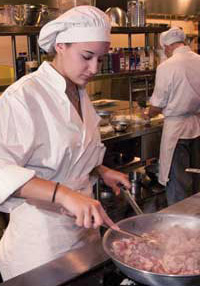
Hospitality Programs
We want to be pampered. We want to be well fed. We want the comforts of home. We want respect and our needs served quickly. We want to be entertained. We are a nation obsessed with food and hospitality. New hotels and restaurants are being built on a staggeringly fast scale. In northeastern Pennsylvania, the hospitality industry is quickly becoming the number one growth industry.
The arena and it's hub stores, minor league sporting events, casino, revitalization of area downtowns like in Wilkes-Barre and Scranton, and the increase of "eating out" has only fueled this surge. Plus, our obsession with food has fueled the Food Network, cable's 24 hours a day food channel. The Food Network has turned chefs into pop stars. Emeril Lagasse and his signature "Bam;" Rachael Ray, the queen of quick cooking; and the culinary expertise of Bobby Flay and Wolfgang Puck, are becoming household names. Even reality cooking shows like Iron Chef, Top Chef, and Hell's Kitchen have debuted with incredible ratings.
With the sudden surge of the hospitality industry, comes the need for more and well-trained workers in these fields. According the Bureau of Labor Statistics, job openings for lodging managers, chefs, cooks, and food preparation workers are expected to be plentiful through 2026. Job opportunities are expected to be best for persons with college degrees in hotel or hospitality management.
"You have to want it in your heart to succeed in this field," says Salvatore Shandra, Department Chairperson for the Hospitality Management programs at Luzerne County Community College.
Shandra says the hospitality industry is growing at such a fast rate graduates are quickly snapped up. "Our graduates find careers as prep line cooks, managers, chefs, sous-chefs, caterers sales or marketing directors, front desk clerks, and some who have started their own businesses."
LCCC's hospitality programs, which now include Hospitality Business Management, Culinary Arts Management, and Pastry Arts, have experienced continual growth. Today, LCCC remains the area's institution of choice among students and employers within the discipline.
The hospitality programs include two-year A.A.S. degrees, certificates and diplomas. The College's pastry arts management program was designed to prepare students for careers in pastry arts or baking in the hospitality industry. The program develops skills and knowledge necessary to obtain entry-level employment in bakeries, restaurants, resorts, casinos, and supermarkets. In addition, the program helps students prepare for careers as pastry chefs, bakers and bakers' assistants.
"We have a wide variety of students in our classes from those who wish to become a professional chefs or bakers to those who just want to learn specific skills which can be used at home," says David Pembleton Jr., professor at LCCC. "Our courses are designed so that beginners can learn at their own pace while the more experienced students can hone their specific skills."
According to Shandra, the programs have been showing significant signs of growth and interest with no signs of stopping. He described the opportunities in the field and gave what he says was a conservative job to graduate ratio of six to one.
According to the Bureau of Labor Statistics, median annual earnings of lodging managers were $51,840 in 2016.
Wages of chefs, cooks, and food preparation workers vary greatly according to region of the country and the type of food services establishment in which they work. Wages usually are highest in elegant restaurants and hotels, where many executive chefs are employed, and in major metropolitan areas. Median pay for chefs and head cooks is $43,180.
Shandra says their new facilities in the Joseph A. Paglianite Culinary Institute in Nanticoke offers the student a world-class training kitchens to hone their skills. "It has become a more creative learning environment," Shandra says. He says the department upgrades its equipment and facilities each year to keep up with what's out there in the community and industry.
While many students continue to work and live in northeastern Pennsylvania, Shandra has received correspondence from students in Florida, California, and as far away as England. He spoke of an alumna who cooks on a schooner off the coast of Florida. "Everyday she actually dives for fresh fish," he says.
"Our students come here form many walks of life," Shandra says. "We don't just teach them to cook, we train them for a career in management." He says executive cooks still need to manage food, people, supplies, and costs. "Our program is so unique because we truly prepare our students for all aspects of this field."
Jim Philips says students enter LCCC's hospitality programs for a number of reasons. "We get students right out of high school, adult students looking for a career change or have been laid-off from their jobs, and many who take classes for personal enrichment or to sharpen their skills for the job they have," he says. "Most of our evening students are adults some of which just want to learn new cooking techniques." Phillips says although most immediately enter the workforce, some of the students continue on to a four-year college, university or culinary school.
Pembleton says the program has a high career to student ratio. "We are highly spoken of by employers in the hospitality industry. Our department has a great deal of pride in our programs with a nice mix of theory and hands-on education."
"You can go as far as you want in this industry as long as you have the work ethic, ability, and drive to succeed," Shandra says. "The sky is the limit."
Learn more HERE


